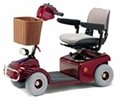
Elderly Nutrition
Tips, Snack Suggestions and More
Maintaining an appropriate body weight through an understanding of proper elderly nutrition (accompanied by physical activity - of course!) is one of the key factors to living well into one's golden years.
Seniors often struggle with how to eat healthy with challenges such as cooking for just one or two or decreased smell or taste, making eating less interesting. It may also be physically difficult to get to the grocery store or prepare meals.
It may be tempting to just have tea and toast, but this diet does not give seniors the energy they need, help their bodies stay healthy or stave off illness.
Seniors bodies change with time and a healthy diet becomes even more important for repairing tissues and bones and keeping the body functioning well. A healthy diet also protects the elderly from chronic disease or infectious illnesses.
Seniors who have proper elderly nutrition have better mental and physical energy and can better enjoy recreation, work, loved ones and their lives. Healthy eating and regular physical activity can mean the difference between living independently into older years or being reliant on others.
Nutrition is Important!
- The elderly have higher rates of high blood pressure, heart disease, high cholesterol and cancer than the rest of the adult population
- These diseases can be controlled or prevented through eating healthily and regular exercise
- Many seniors are over-weight but...
- No one is ever too old to lose weight. Losing even 5 pounds can make a huge difference to a senior's health
- Many seniors do not do as much exercise as they could
- Elderly who do an hour a day of physical activity have better heart health and are a healthier weight than those not as active
- Most elderly men do not eat enough fruit, vegetables or milk products
- Most senior women do not eat enough grains, fruit, vegetables, milk products and meat products
- Many seniors do not get enough vitamin B6 or B12, folate, vitamin C or calcium through the food they eat
- The right amount of vitamins and minerals can help prevent memory loss, anemia or depression. They can also keep bones strong and healthy, and help with recovery after an injury or surgery.
- The majority of seniors eat more salt (sodium) than the recommended amount which can cause high blood pressure and other heart problems
- Decreasing the amount of salt eaten can dramatically reduce a high blood pressure
- Seniors can change the way they eat and improve their health at any age
Proper elderly nutrition - healthy eating - and regular exercise will keep people healthier day-to-day and over the long-term.
Quick Tips For Improving Nutrition
- Eat one more fruit or vegetable a day
- Drink one more glass of water a day (women should drink at least nine 8 ounce-glasses and men should drink at least twelve 8 ounce-glasses)
- Eat fish once to twice a week (not cooked in butter ; )
- Choose whole grain or 100% whole wheat bread for sandwiches
- Try a fruit or vegetable that you have never tried before
- Consult with your doctor or dietician about a multivitamin; seniors
- Particularly need more vitamin B6, B12, C, D and folate, calcium and magnesium
- Eat a wide variety of foods
- Eat in moderation, portion size is important - especially when a person is less active. Serving sizes are outlined in following section. Your plate should look like this: 1/2 colourful veggies, 1/4 meat, poultry, fish, tofu or legumes, 1/4 whole grain products and side of fruit or low-fat yogurt as a replacement for sweet desserts
Eat More:
- Vegetables
- Fruits
- Whole grains (whole grain bread, whole grain pasta, brown rice, oatmeal)
- Fish
- Legumes (dried beans, peas, lentils)
- Foods rich in calcium (low-fat milk products, yogurt, cheese)
- Lean poultry and meat, cut off the excess fat and take off skin
- Unsaturated fats (vegetables oils, nuts, seeds, avocado)
Eat Less:
- Saturated fats (butter, lard, deli meats, bacon, sausages)
- Trans fats (processed foods, cookies, cakes, deep fried foods)
- Salt and sugar (includes drinks with a lot of sugar as well as jam, candy, baked goods)
- Refined and enriched grains
For proper elderly nutrition, try to eat some of each of the four food groups every day (portion sizes suggested below):
- Vegetables and fruits
- Grain products (includes pasta, bread, cereals)
- Milk products and alternatives (low fat cheese, yogurt, fortified soy beverages)
- Meat - poultry, fish, shellfish, lean meat - and alternatives (lentils, beans, eggs, tofu, nuts)
Low Fat Snacks Suggestions
- Fruits and veggies
- Gingersnaps
- Fig cookies
- Melba toast
- Whole wheat crackers with less than three grams of fat per serving
- Low fat yogurt
Return to Elderly Health Problems
Return to Caring for Aging Parents






New! Comments
Have your say about what you just read! Leave me a comment in the box below.